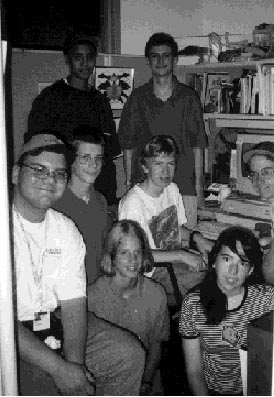
For $10 a year, an Academy member gets the opportunity to learn about science from professionals who share their knowledge and experience. These men and women become mentors for aspiring scientists in CSA, offering firsthand perspectives about a science career. They dispel the stereotype that scientists are "nerds," and help foster a realistic understanding of what to expect in the job market. The mentoring process is a worthwhile experience for CSA members, many of whom are contemplating college or career choices.
In April, for example, scientists from University of Pittsburgh's Department of Neuroscience gave an interactive lecture on the functioning of the brain, complete with models and machines used to monitor brain activity. Bayer scientist Karl Haider did a chemistry show in May and Dr. Kenneth Boyd spoke on "Vaccines vs. Viruses" in June.
There are diverse sub-groups within the Academy. A bioscience team is working with Carnegie Science Center exhibit designers on a floor display that will give an overview of genetics. Aspiring flight engineers from the rocketry group will compete in a model rocket contest this year. Newly elected president John Kotwicki, a sophomore at Fox Chapel Area High School, is webmaster for the Science Academy's web page, http://csa.clpgh.org, a creation of the Internet resources group.
Kotwicki would like to see the Academy offer more special interest groups, partnerships with other organizations, and additional field trips and programs. His Internet group has brought a new dimension to the Academy's membership list, bringing in members from as far away as Australia. The online site also features journal entries from CSC astronomer Martin Ratcliffe as he trekked across Utah observing Comet Hale-Bopp, updates on Academy meetings, and links to other science-related web sites.
Field trips are always on the Carnegie Science Academy calendar. In January, members traveled to Inventure Place in Akron, where they became inventors for a day, and in June the group visited Wallop's Island in Virginia to study marine biology and oceanography. But Carnegie Science Academy isn't just about science. It's also about building interpersonal and decision-making skills, and making new friends. When they aren't peering through a microscope or writing HTML documents for the World Wide Web, members are eating pizza at a dance in The Works Theater, or celebrating graduation with college-bound peers.
The Academy works just like any other professional organization, with elected officials and its own quarterly newsletter, The Mind's Eye. This publication is written by members and documents CSA activities, field trips, guest speakers and social events, and it even includes brain teasers and science crossword puzzles. It comes free with CSA membership.
Adults can be part of the fun of Carnegie Science Academy by presenting a scientific topic at a monthly meeting or by volunteering to be a mentor. If you would like to donate time, or know a high-school student who'd like to become a CSA member, contact Denise Turso at (412) 237-1821 or send e-mail to tursod@clpgh.org.
Mark Petruzzini is electronic editor of Carnegie Magazine.